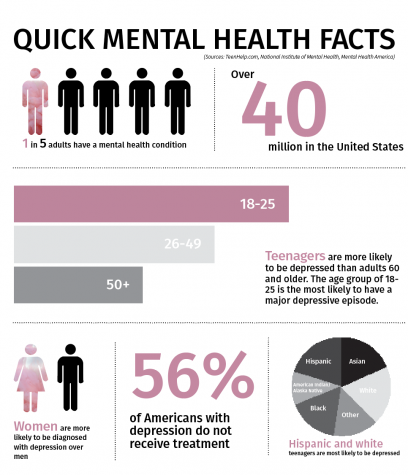Your donation will support the student journalists of Francis Howell North High School. Your contribution will allow us to purchase equipment and cover our annual website hosting costs.
A Cloud Over Teenagers
Published: December 18, 2017
One in eight. That’s how many American teenagers in 2015 had a depressive episode lasting at least two weeks, according to the National Institute of Mental Health. Despite the numbers, depression often goes untalked about. Teenagers are left alone, covered by a cloud that won’t clear.

Credit to Alex Rowe
Many students are affected by depression. Others don’t always understand the influence of depression and other mental illnesses on teenagers, and how they affect students’ academics, relationships and growth.
Mental Health Affects Teens
Acting out. Grades dropping. Difficulty sleeping. Isolation.
Mental health concerns affects, about 20 percent of teens in the U.S., according to the National Institute of Mental Health, and at FHN specifically, just last year about 12,000 students visited counselors for personal issues, the majority being for mental health.
Counselors can meet with students once or twice a week if that’s what the student feels he or she needs. Counselors talk to each student differently, because each student copes with mental health in a different way, though counselors do have a common method.
“We talk about what went well in your day and when was the last time you felt good, when was the last time you exercised, are you eating right, are you getting away from the negative effects of social media if that makes you feel low,” Head Counselor Lisa Woodrum said. “It’s really case-by-case, because maybe that person is depressed and has straight A’s or maybe that person is failing everything because of their depression. There are so many different ways to approach that conversation, and we try the best we can to find that.”
Sometimes, teachers may notice a change in the classroom without a student coming to them. For example, if grades drop, participation decreases or a student becomes more irritable, they may report it to the Student-Teacher Academic Intervention Team, a team made up of a counselor, an administrator, a special education teacher and a diagnostician used to determine what should be done to best help a student in need of intervention. The counselor then will schedule a time to meet with the student and a parent or guardian. If meeting once or twice a week isn’t enough, the student can meet with Emotional Support Counselor Barry Morrison, who can dedicate more time to the student.
“I meet with students individually,” Morrison said. “I do group work with students, and I handle crisis situations. I also work with students to create new techniques and strategies to handle situations. Some kids I meet with because of substance abuse, so I work with them to see what that’s about. It’s really looking at the underlying things that are going on and working with them on those to help them be successful as students.”
Though the counselors are available, promote a positive environment and spend a lot of time with students to make them comfortable, students may choose not to ask for help anyway, either because they find another way to cope or because they feel uncomfortable.
“I know it took me over a year to feel comfortable [talking about myself with my counselor],” junior Eve Abuazza said. “I think a lot of students feel that way, especially when talking about their personal issues. It would just make them uncomfortable to share all that.”
While counselors work directly to help students with face-to-face conversations, this year FHSD has implemented a new program in the elementary schools called Inspire that helps young students indirectly. The program focuses on the social-emotional needs for students, staff and family. Its goal is to advise teachers and counselors on how to help the students who are in their classrooms or the students they meet with. The Inspire program helps those in a student’s environment be there to support and adjust to a student’s needs to best help them with mental health.
“That comes through training students by giving them the tools to handle and react in a way that is healthy,” Adam Corbitt, special education teacher for the Inspire program, said. “I meet with teachers and look at students’ social history and possibly create a trauma plan and for the students in general we also have safety plans. Instead of a reaction team, we are a prevention team.”
A trauma plan and a safety plan for younger students are things like zones of regulation. The zones hold pictures of emotions that a child might be feeling, and it helps them identify the emotions that might be bothering them.
“It’s teaching them what the word is and what the feeling is about and then how to manage it,” Corbitt said. “It’s working through some of those feelings when you know what it is and so teaching kids that are younger, the goal is that they are aware of it, and they can keep working through it so when they get to be, if it’s still a condition they are working with, it becomes more manageable.”
Both Corbitt and Morrison think the Inspire program should be expanded to the high school level and hope it will in the future. Even without the program in higher levels of education, FHSD has still made mental health a bigger focus, especially with the hiring of a mental health director, Cherie Magueja, whose sole job is to focus on mental health in the district. Schools are working to help students the best they can to inform students and people in their surrounding environment.
“A lot of people believe that kids are doing these things on purpose or that kids are just mean or that kids are just participating in poor behavior just because,” Morrison said. “I think a lot of it is understanding that sometimes a reaction to something or the symptom of something of a diagnosis is really part of why they are doing what they are doing. If we can understand it, we can support it.”

Credit to Alex Rowe
Many students are affected by depression. Others don’t always understand the influence of depression and other mental illnesses on teenagers, and how they affect students’ academics, relationships and growth.
Q&A: Counselor Ann Herman
 Photographer McKayla Bogda
Photographer McKayla Bogda
What should students know about depression if they don’t have it themselves?
I would say that depression is not an uncommon experience, and that it can affect anybody at any stage of their life. It’s important that we understand it to help remove any stigma that people fear might be attached to it.
What are some misconceptions about depression?
Some common misconceptions are that it is something that you can just get over, that if you just think happy thoughts, it will go away and that it only affects people that have bad things happening to them in their life.
What are the signs of depression?
The signs of depression can vary according to the person, but some common signs we see, especially at the teenage stage, would be things like withdrawing from friends and withdrawing from activities that somebody once found fun and enjoyable. It might include things like feeling sad or irritable. Sometimes, we might see an impact on grades or a sudden change in activity or performance for that student.
How should students respond when they find out someone has depression?
I think as a general rule, it’s always appropriate to be supportive of the person, to offer to be there as a person if they feel like they want to talk. But also, because we are talking about teenagers, it is also important that the friend does not feel responsible to carry that burden by themselves, so I think talking to an adult or encouraging their friend to talk to an adult is extremely important and not being afraid that your friend is going to be angry because you went to an adult to try to get them help.
What should students do to understand depression?
I think some of the signs are taught here at school in different classes like health and psychology and even some of the counseling lessons that we do here in the school. There are a lot of other resources out there in the community and online, and I would just encourage students to try to learn more about it through those resources, so they can be a support for anybody in their life that is going through that.
At what point should students bring the issue to an adult if they notice any of the signs of depression in another student?
I think it’s always a good idea to bring it to the attention of an adult to try to help get resources and support and help for a friend, but definitely if you have any concern at all that the person has any self-harming thoughts. That’s where I would want a student to never worry about getting their friend in trouble because that won’t happen, or their friend being angry with them because the priority is keeping their friend safe.
If a student does want to help their friend, where should the student go?
I would say any trusted adult, so if it is here at school, they could talk to a teacher, a counselor, a principal. If it’s outside of school, their parents, their friend’s parents or even calling one of those hotlines.
How can students help other students with depression?
Try to understand it, and try to be a support to their friends while also asking for the help of a trusted adult.
What can the school do to help create a better environment to prevent depression or to help students with depression?
Teenagers have a lot on their plates with the potential stressors of school and peer issues and social media and so many things that they have going on that I just think that it’s important that we collectively as a school community look out for each other, know the signs and know what the resources are in our building in our school to help anybody that might be struggling.
How can students help change the stigma around depression?
The stigma that is attached with depression is getting better than it was many years ago, but I think that we can continue to make it better by recognizing that it can affect anybody. It’s not a sign of weakness, and when we come to view mental health concerns in the same way that we do other physical health concerns, then we’ll be in a better place. We’re getting closer to that, but I think if we can all still continue to work on that, that would be good.

Credit to Alex Rowe
Many students are affected by depression. Others don’t always understand the influence of depression and other mental illnesses on teenagers, and how they affect students’ academics, relationships and growth.
Depression Affects Every Aspect of Life
Teenagers have a lot to do in their everyday lives. From keeping up with their grades to attending social events with friends, they can get stressed and isolated from the important things that shape them into adults. The group most prone to this stress is adolescents, specifically the ones who carry mental health concerns.
“The difficulty I have is this persona with this image of a protective layer that comes when I help patients,” Lia Roth, social worker, counselor and former clinical psychologist, said. “Then when you get to that point of someone opening up, it’s not about words so much. Learn to listen. Sometimes listening is far better than 1,000 words. Sometimes just sit there next to the person and don’t say anything. Be open and non-judgemental.”
Family
According to Roth, when somebody is born, they automatically take after the person or people raising them. They learn from them. If that parent, who is supposed to be a role model to them, fights with their own mental health or other problems, it can reflect onto their child. Families who go through divorce or drug and alcohol problems, who have a genetic illness or who just aren’t taking on the role the child needs might have more of these issues.
“I do see that many parents blame themselves,” Roth said. ”And my suggestion is it’s not about blaming anyone. It’s about learning there is an issue and going through the process of finding help to solve the issue.”
Situational Issues
One of the main mental health concerns associated with genetics, and even family situational issues, is depression. Not every teen who goes through a family crisis is depressed. It’s the same for someone who has an ideal family. According to Roth, people who have split parents or who have families who aren’t as supportive are just more prone to having a mental health concerns.
“Parental depression affects kids tremendously,” psychologist Bart Andrews said. “It affects the entire family system. Even if parents don’t feel like their kids are depressed, they have to sense something isn’t right. When someone in the family is struggling with severe emotional pain, depression or anxiety, it affects everybody.”
Everyday Life
Stress caused by mental health concerns can lead to sleeping and eating changes. For sleep, it can lead to either oversleeping or undersleeping. It’s the same for eating: someone might not eat or may overeat. These changes are solely to isolate and escape from what the person is suffering from. The fatigue or loss of energy affects how the person acts in their everyday life. It changes them as a person. According to the National Sleep Foundation, children aged 11-17 found a strong association between mood and sleep, and 73 percent reported not sleeping enough at night. These symptoms can essentially make more symptoms by making the person feel irrational or exhausted.
“Sleep disturbance is a big contributor to emotional distress and mental illness,” Andrews said. “Kids aren’t getting enough sleep anymore because they’re on their phones and that can lead to anxiety and depression.”
Education
When they go school, a lot is expected out of students. With depression, the stress can start with someone slowly slipping off their normal schedule. School work gets behind, tests get failed and extracurriculars get skipped. According to the National Institute of Mental Illness, approximately 20 percent of teens will experience depression before they reach adulthood.
“If someone is experiencing mental illness, it’s going to affect their school work,” Andrews said. “We know that anxiety and depression affect the ability for someone to retain information, concentrate and recall information. Depression especially affects somebody’s reaction time and long-term memory.”
Social Life
Social media can help and hurt mental health. Teens can be social, but they aren’t getting face-to-face contact. Andrews says that teens need to take breaks from phones to be healthy. On the flip side, teens who feel isolated or different can reach out to thousands of teens on the Internet who feel the same way.
“It’s a way for kids to not have to be alone,” Andrews said. “It’s a way for someone to never be alone. It’s a way to connect. If teenagers are having a hard time, I think it’s easier for them to reach out on the Internet. Social media can be good or bad. Kids do need structure around it. They need to put a stop to negativity and reach out to the good resources.”
Helping a Friend
According to Andrews, if someone has a friend who is suffering from depression, the first step is to learn about what depression is. Remember that standing on the sidelines and being there for someone can’t necessarily fix the problem, but in some cases it can help. Being a listener to a friend can help someone more than anything.
“When we feel bad, the reason we act differently is for people to help us,” Andrews said. “That is in fact the whole reason we have these bad feelings, is for people to reach out to us and see how we’re doing. This social interaction is very important when someone is suffering. It’s almost like getting out of that isolation stage.”

Credit to Alex Rowe
Many students are affected by depression. Others don’t always understand the influence of depression and other mental illnesses on teenagers, and how they affect students’ academics, relationships and growth.
Mental Health Concerns Explained
DEPRESSION: A sustained chronic sadness where the person feels hopeless, worthless and helpless for more than two weeks.
SYMPTOMS:
Lack of energy
Feeling sad more often, especially in the morning
Consistent feeling of guilt
Difficulty with focus, remembering details and making decisions
Oversleeping or inability to sleep
No longer finding pleasure in everyday activities
Thoughts of suicide
Feeling restless
Losing or gaining weight
ATTENTION DEFICIT HYPERACTIVITY DISORDER (ADHD): Inability to focus, control impulses and control hyperactivity.
SYMPTOMS OF ADULTS:
Forgetfulness, causing lateness at times
Anxiety and depression
Anger control issues
Lack of organization
Procrastination
Frustrated easily
Easily bored
Mood swings
Inability to focus
Racing thoughts
BIPOLAR DISORDER: Extreme changes of mood from depressed to mania, the complete opposite, with normal moods sometimes in between.
SYMPTOMS:
Increased activity
Feeling energized
Overwhelming number of thoughts
Aggressive behavior
ANXIETY: Feeling anxious more than the average person, overwhelming amount of constant worry and fear.
SYMPTOMS:
Rapid speech
Panic and general uneasiness
Feeling restless
Tingling hands or feet
Shortness of breath
Inability to sleep
Higher heart rate
Dry mouth
Nausea and dizziness
Tense muscles

Credit to Alex Rowe
Many students are affected by depression. Others don’t always understand the influence of depression and other mental illnesses on teenagers, and how they affect students’ academics, relationships and growth.
Kirkwood Hosts Suicide Awareness Day
Bridget Snider wants to end the stigma. Clutching a basket of yellow wristbands with the same message, this KHS senior helps other members of the Kirkwood Call, their school newspaper, get ready for the morning ahead. It’s an important one.
They set out whiteboards and Expo markers on tables near two entrances to their school, writing the prompt “I stand for…” on all of them. They wait.
Not everyone will stop. Some students will rush by, the cold October morning or the weight of their textbooks driving them inside.
But others will. When they do, they will finish the prompt, take a picture and leave with a bracelet. For Snider and other members of the Suicide Awareness Week Admin Board, getting their teachers and peers to open up about mental health and suicide, even in this little way, is a victory.
“There are a lot of kids on Call who thought that the topic was important and that it needed to be talked about more,” Snider said. “A lot of the time, it’s forgotten in schools, and it’s not really something that they like to talk about because it’s such a heavy topic. We just kind of felt the need, that it needed to be a more open topic in conversation and wanted to get people more involved.”
The SAW Admin Board at KHS, run by students from their journalism program, hosts a full Suicide Awareness Week every spring, with activities ranging from a guest speaker to a food truck night with the goal of bringing awareness to mental health. This year, they decided to add a whiteboard day in the fall, on Oct. 24, to start the conversation early.
“It’s something that needs to be talked about year-round,” senior Camille Baker, another SAW Admin Board member, said. “It’s not something that we can necessarily only have a week for, and we wish that we could always do something for it and we always try to, but it’s also something that we need to make sure we’re incorporating within the school year-round.”
Despite the cold weather, students took a few moments to fill out whiteboards on the day in October, including senior Dillon Thompson.
“It’s sort of a thing that everyone turns away from,” Thompson said. “I know a few people who are affected and, to be honest, not a lot of people like to talk about it. It’s kind of this ugly thing.”
With their fall whiteboard day behind them, SAW members will begin planning their week in the spring, continuing to get people talking about mental health and fighting the stigma. They hope to make everyone more comfortable with the topic so those affected can find help and understanding.
“I would just love to see stuff like this happening more within St. Louis, within the nation, within other schools,” Baker said. “I hope that just by doing little things like this it can kind of spark a bigger conversation, whether that be just within families, within our school community, wherever. Honestly, the more we can talk about this topic, the better it will be. It is really uncomfortable to talk about these things right now and that’s not how it should be.”



